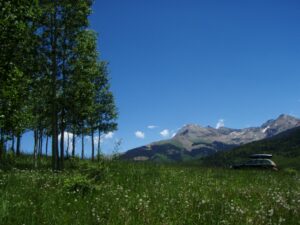William Anderegg
Professor in the School of Biological Sciences
Leadership Team member, Wilkes Center for Climate Science and Policy
Contact Information
801-587-3761
anderegg@utah.edu
Curriculum Vitae
Select Publications
Anderegg, W.R.L., T. Collins, S. Grineski, S. Nicholls, C. Nolte
Climate change greatly escalates forest disturbance risks to US property values.
Environmental Research Letters. 18: 094011, 2023.
W.R. Anderegg, C. Wu, N. Acil, N. Carvalhais, T.A. Pugh, J. P. Sadler, & R. Seidl, R.
A climate risk analysis of Earth’s forests in the 21st century.
Science, 2022.
W.R. Anderegg, J.T. Abatzoglou, L.D. Anderegg, L. Bielory, P. L. Kinney, & L. Ziska.
Anthropogenic climate change is worsening North American pollen seasons.
Proceedings of the National Academy of Sciences, 2021.
W.R. Anderegg, A. G. Konings, A. T. Trugman, K. Yu, D. R. Bowling, R. Gabbitas, et al.
Hydraulic diversity of forests regulates ecosystem resilience during drought.
Nature, 2018.
Websites
Anderegg Lab, Research Site

Bio:
Primary Areas of Research:
Awards and Recognitions
In the Media
2023
-
- Wall Street Journal An Allergy Season So Bad You Don’t Need Allergies to Feel Miserable
Washington Post <https://www.washingtonpost.com/climate-environment/2023/03/16/allergy-season-pollen-count-climate/> - TIME Magazine <https://time.com/6278183/allergy-season-worse-health-impact/>
- The Atlantic <https://www.theatlantic.com/science/archive/2023/05/seasonal-allergies-pollen-climate-change/673935/>
- Guardian <https://www.theguardian.com/society/2023/mar/15/allergy-season-starting-earlier-global-heating-climate-change>
- Yahoo News
- TIME Magazine on property value at risk <https://time.com/6305819/climate-change-wildfires-property-value-at-risk/>
- Forbes: <https://www.forbes.com/sites/darreonnadavis/2023/08/17/wildfires-could-damage-11-billion-worth-of-properties-in-coming-decades-study-finds/?sh=6eb4ccad2449>
- Wall Street Journal An Allergy Season So Bad You Don’t Need Allergies to Feel Miserable
2022
-
- NPR Here & Now <https://www.wbur.org/hereandnow/2022/08/11/why-allergies-are-worse>
- NPR All Things Considered <https://www.npr.org/2022/03/15/1086733875/hotter-temps-bring-more-pollen-meaning-climate-change-will-intensify-allergy-sea>
- Associated Press <https://apnews.com/article/climate-science-business-health-united-states-f45d7a1ceb97703ce3987fc091c2e8a9>
- National Geographic <https://www.nationalgeographic.com/magazine/article/forests-future-threatened-heat-drought-feature>
2021
-
- ProPublica <https://www.propublica.org/article/the-climate-solution-actually-adding-millions-of-tons-of-co2-into-the-atmosphere>
- New York Times <https://www.nytimes.com/2021/02/08/climate/climate-change-pollen-season.html>
- Associated Press <https://apnews.com/article/pollen-season-starts-february-3ada37b21b5ff6ffaf3fa22bbc61a743>
- Washington Post <https://www.washingtonpost.com/weather/2021/04/20/washington-dc-tree-pollen-climate/>
- NBC Nightly News <https://www.nbcnews.com/health/allergies/nothing-sneeze-global-warming-triggers-earlier-pollen-n1257081>
- NPR Science Friday <https://www.sciencefriday.com/segments/climate-change-allergies/>
2020
-
- Bloomberg<https://news.bloomberglaw.com/environment-and-energy/scientists-question-trillion-trees-plan-as-climate-strategy>
- Gizmodo <https://www.gizmodo.com.au/2021/09/climate-progress-is-on-fire/>
- Rolling Stone <https://www.rollingstone.com/politics/politics-features/tree-planting-wont-stop-climate-crisis-1020500/>
